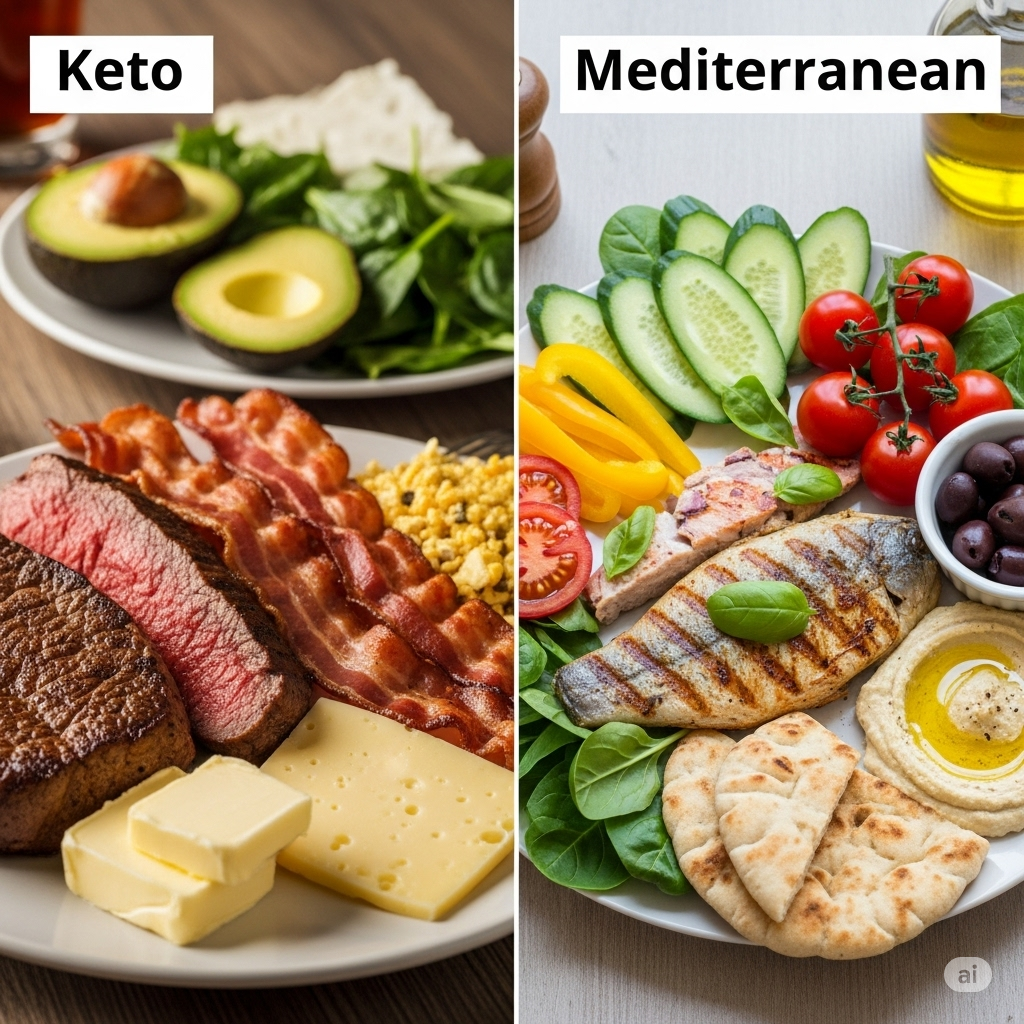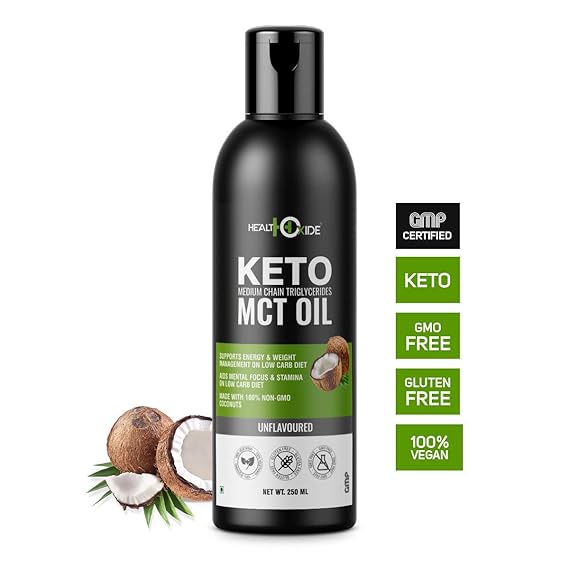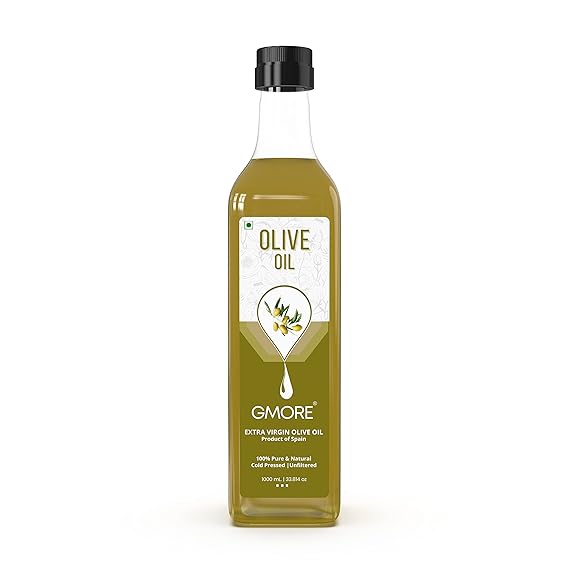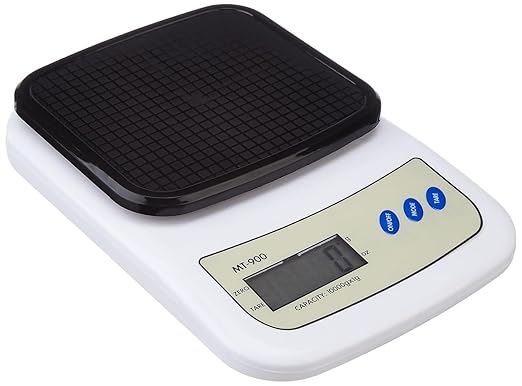Keto vs. Mediterranean: Which Diet Is Right for You?
When it comes to healthy eating, the choices can feel overwhelming. Among the most talked-about diets, the Keto diet and the Mediterranean diet stand out for their popularity and results. Both claim to improve health, help with weight management, and reduce the risk of chronic diseases. But they couldn’t be more different in their approach to food.
So, which diet is right for you—Keto or Mediterranean? Let’s dive deep into how they work, their benefits, potential risks, and which lifestyle they suit best.

Understanding the Keto Diet
The Ketogenic (Keto) diet is a low-carbohydrate, high-fat eating plan designed to shift your body into a state called ketosis. Normally, your body uses carbohydrates as its main source of fuel. By drastically reducing carbs and increasing fat intake, your body begins to burn fat for energy, producing ketones in the liver.
If you’re starting Keto, MCT Oil is one of the most recommended supplements to boost energy and maintain ketosis.
Key Principles of Keto:
- Carbs: Less than 5–10% of daily calories (around 20–50 grams per day).
- Fats: Around 70–75% of daily calories.
- Proteins: Moderate intake, about 20–25% of daily calories.
Foods to Eat on Keto:
- Healthy fats (avocados, olive oil, coconut oil)
- Fatty fish (salmon, sardines, tuna)
- Low-carb vegetables (spinach, broccoli, zucchini)
- Meat and poultry
- Nuts and seeds

Foods to Avoid on Keto:
- Grains (rice, wheat, oats, pasta)
- Sugary foods and beverages
- High-carb fruits (bananas, mangoes, apples)
- Legumes (beans, lentils)

Understanding the Mediterranean Diet
The Mediterranean diet is based on the traditional eating habits of countries bordering the Mediterranean Sea, such as Greece, Italy, and Spain. Unlike Keto, it is not about strict carb restriction but rather about balanced, nutrient-dense eating.
Key Principles of Mediterranean:
- Healthy fats: Focus on monounsaturated fats, mainly from olive oil.
- Plant-based foods: Abundant fruits, vegetables, whole grains, nuts, and legumes.
- Protein: Lean meats, fish, and moderate dairy intake.
- Lifestyle: Encourages social meals and physical activity.
A high-quality extra virgin olive oil is the foundation of Mediterranean cooking. This one is highly rated on Amazon.
Foods to Eat on Mediterranean:
- Whole grains (brown rice, quinoa, oats)
- Fruits and vegetables
- Olive oil as the main fat source
- Fish and seafood
- Nuts, seeds, legumes
- Red wine (in moderation)
Foods to Limit on Mediterranean:
- Red and processed meats
- Butter and refined oils
- Highly processed foods and sweets

Keto vs. Mediterranean: Nutritional Differences
| Aspect | Keto Diet | Mediterranean Diet |
| Carbs | Very low (20–50g/day) | Moderate (whole grains, fruits, legumes allowed) |
| Fats | High (70–75% of calories) | Healthy fats (mainly olive oil, nuts, fish) |
| Proteins | Moderate | Moderate, lean protein focus |
| Flexibility | Strict, hard to maintain | More flexible, sustainable long-term |
| Primary Goal | Weight loss, fat burning | Heart health, longevity, overall well-being |
Health Benefits of the Keto Diet
- Rapid Weight Loss
Keto is known for quick results in fat loss due to reduced carb intake and water weight loss. - Blood Sugar Control
Helpful for people with Type 2 diabetes as it lowers blood sugar and insulin levels. - Improved Mental Clarity
Some report increased focus and mental energy when in ketosis. - Reduced Appetite
High-fat meals tend to be more filling, which naturally reduces calorie intake.
Health Risks and Drawbacks of Keto
- Nutrient Deficiency: Avoiding carbs can mean missing out on fiber, vitamins, and minerals.
- Keto Flu: Initial side effects include fatigue, headache, nausea, and irritability.
- Heart Health Concerns: High intake of saturated fats may increase cholesterol in some people.
- Difficult to Sustain: Strict carb restriction makes it hard to maintain long-term.
Health Benefits of the Mediterranean Diet
- Heart Health
Rich in healthy fats and antioxidants, this diet reduces the risk of cardiovascular disease. - Longevity
Studies link it to longer life expectancy and reduced risk of chronic diseases. - Weight Management
Though not designed for rapid weight loss, it helps maintain a healthy weight sustainably. - Brain Health
Associated with lower risks of Alzheimer’s and cognitive decline. - Gut Health
High fiber intake supports a healthy digestive system and microbiome.
Risks and Drawbacks of the Mediterranean Diet
- Slower Weight Loss: Results are gradual compared to Keto.
- Less Structure: It is more of a lifestyle guideline, which may confuse people seeking strict rules.
- Calorie Overload Risk: Overconsumption of olive oil, nuts, or wine can lead to excess calories.
No matter which diet you choose, portion control is key. A digital kitchen scale like this one can help you stay consistent.
Which Diet Is Right for You?
The choice between Keto and Mediterranean comes down to your goals, lifestyle, and health conditions.
- Choose Keto if:
- You want rapid weight loss.
- You don’t mind cutting carbs almost entirely.
- You’re comfortable eating a high-fat diet.
- You want to control blood sugar levels quickly.
- Choose Mediterranean if:
- You’re looking for a long-term, sustainable lifestyle.
- You want to improve heart health and longevity.
- You enjoy a variety of plant-based foods, grains, and fish.
- You prefer flexibility without strict food rules.

Both diets have unique advantages. Keto may give you fast weight loss results, but it comes with challenges and may not be sustainable long-term. The Mediterranean diet, on the other hand, is easier to maintain, backed by decades of research, and offers benefits that extend well beyond weight management.
Ultimately, the best diet is the one you can stick to consistently while supporting your health goals and lifestyle. For many, the Mediterranean approach proves more sustainable, while Keto may be better suited for short-term goals.







